Being Assertive Training Course in Norway
Our corporate training course is also available in Oslo, Bergen, Stavanger, Trondheim, Drammen, Fredrikstad, Kristiansand, Sandnes, Tromsø, Sarpsborg, Skien, Ålesund, Sandefjord, Haugesund, Tønsberg, Moss, Porsgrunn, Bodø, Arendal, Hamar, Ytrebygda, Larvik, Halden, Lillehammer, Mo i Rana, Molde, Horten, Gjøvik, Askøy, Kristiansund, Flåm, Geiranger, Svolvær, and Kirkenes.
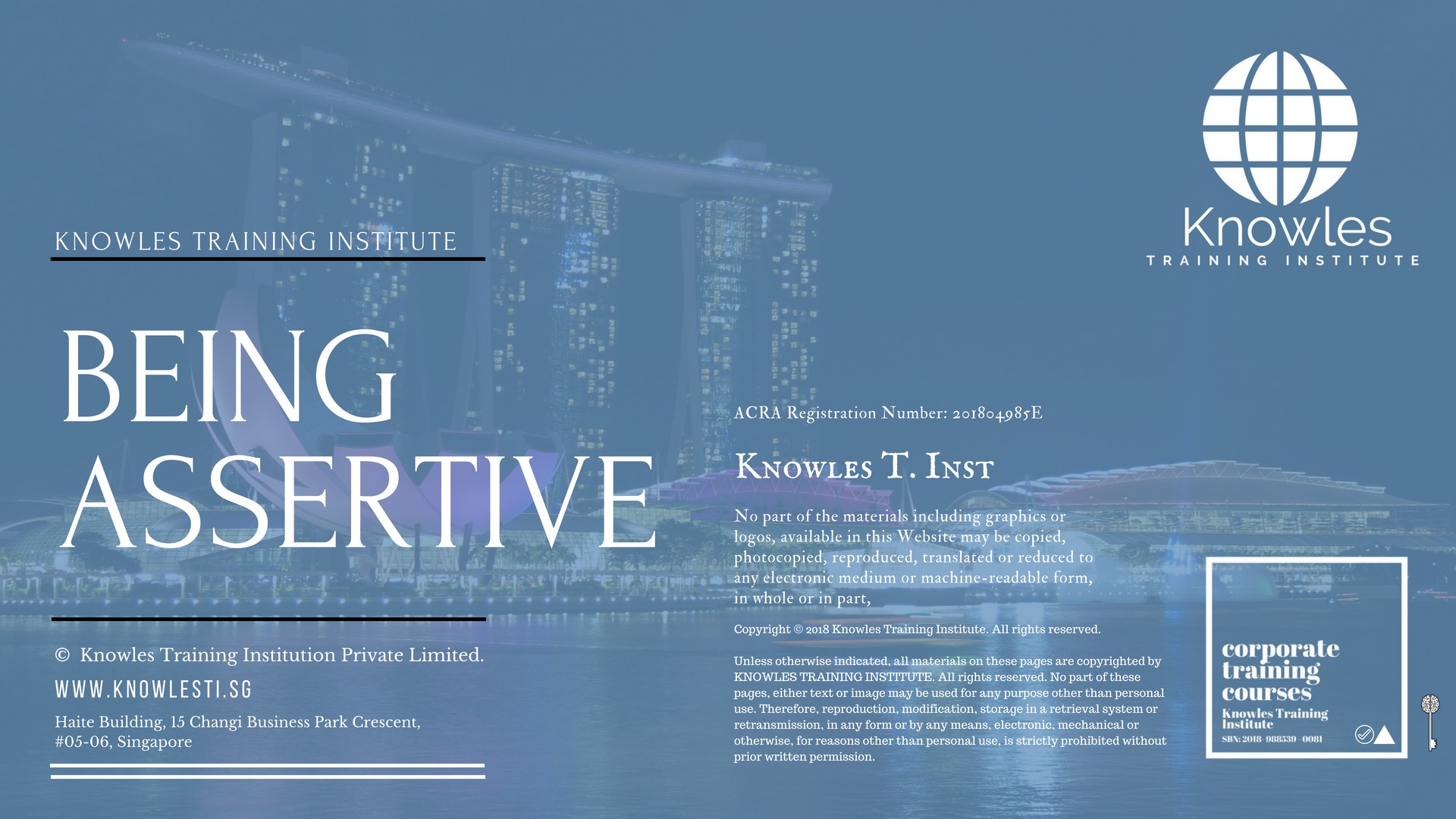
About This Being Assertive Training Course in Norway
Assertive Training Course in Norway
Do you feel intimidated easily by others? Do you let yourself be taken advantaged of? Do you prefer to avoid conflicts and keep to yourself? Have you often felt that you could have done better instead of repeating the same mistakes over and over when handling a conversation?
If you answered “yes”, this course is for you. You will discover how to boost your confidence and express assertively. In the course of your job, you will need to handle different people, whether they are aggressive or passive. Doing this well requires skill, which this course will help you master.
Assertive staff are very profitable to companies, as they can express themselves openly, get things finished, not taking no for an answer (useful when bargaining with clients), while appearing polite, professional and fair.
This course has many useful step-by-step guidelines on how to greet others and structure sentences to obtain the greatest results. You will discover the science behind manners such as passive-aggressive behaviour, correct attitudes, body language, and techniques of communication. You also learn how to remain in control and convey that to others.
Working through case studies, role-play in practical exercises and continually performing the skill to perfection is the best way to conquer assertive techniques. This approach which is used in this course allows you to understand the content thoroughly. After this course, you will positively overcome real-world challenges as they arise.
Who Should Attend This Being Assertive Training Course in Norway Workshop
This Being Assertive Training Course in Norway workshop is ideal for anyone who would like to gain a strong grasp and improve their Being Assertive.
All Staff Within An Organisation
Managers
Team Leaders
Executives
Assistants
Officers
Secretaries
Group Size For This Being Assertive Training Program in Norway
The ideal group size for this Being Assertive course in Norway is:
Minimum: 5 Participants
Maximum: 15 Participants
Course Duration For This Being Assertive Skills Course in Norway
The duration of this Being Assertive workshop Training Course in Norway is 2 full days. Knowles Training Institute Norway will also be able to contextualised this workshop according to different durations; 3 full days, 1 day, half day, 90 minutes and 60 minutes.
2 Full Days
9 a.m to 5 p.m
Being Assertive Course in Norway Benefits
Below is the list of course benefits of our Being Assertive course in Norway
- Increase fearlessness and confidence
- Comprehend and perceive your emotions
- Gain regard from others.
- Enhance correspondence skills.
- Make win-win circumstances.
- Enhance your basic leadership aptitudes.
- Helps to make legit connections.
- Enable to acquire work fulfilment.
Being Assertive Course in Norway Objectives
Below is the list of course objectives of our Being Assertive course in Norway
Assertiveness Course in Norway Objective- Part 1
- Differentiate among assertive, aggressive and passive behaviour
- Using specific verbal and non-verbal techniques to express yourself assertively.
Assertiveness Course in Norway Objective- Part 2
- Ask what you want assertively and receive it
- Criticise and improve behaviour while staying friends
Assertiveness Course in Norway Objective- Part 3
- Reinforce the behaviour of others using a simple technique
- Objectwith the other person in such a way that encourages them to understand your stance on the matter without taking it personally
- Say No and be loved for it!
Course Content For This Being Assertive Training Course in Norway
Below is the list of course content of our Being Assertive training course in Norway
Assertiveness Training Course in Norway – Part 1
What is Assertiveness?
- Differences between passive and aggressive behaviour
- Examples of assertive behaviour
- While being assertive, how to avoid being seen as aggressive
- How to deal with passive-aggressive behaviour
Assertiveness Training Course in Norway – Part 2
How to Criticise?
- What makes criticisms good or bad
- Reactions to criticism by different kinds of people
- How to change people’s behaviour and criticise them correctly
- How to accept criticism
- Using a step-by-step method to provide constructive feedback
Assertiveness Training Course in Norway – Part 3
How to Deal with Emotions?
- How to use emotional appeal to the maximum effect
- How to show your view assertively, consistently
- How to use body language to convey your message and receive what you want
- How to differentiate between various behaviours using non-verbal messages
Assertiveness Training Course in Norway – Part 4
How to Request?
- How to ask for what you want
- How to structure your sentences to get your message across positively
- Using advanced techniques to answer someone when your request is not met.
Assertiveness Training Course in Norway – Part 5
How to Praise?
- The effects of praising?
- Why is praising difficult?
- How to give your praise to get the maximum results
Assertiveness Training Course in Norway – Part 6
How to Disagree?
-
- How to say no
- How to convey your disagreement and remain friends
- The 6-step disagreement technique
Being Assertive Course in Norway Value Added Materials
Each participant will receive the following materials for the Being Assertive course in Norway
Assertive Training Course in Norway Learner’s Guide
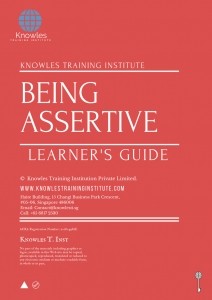
Assertive Training Course in Norway Handouts
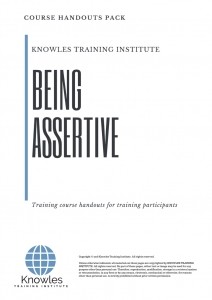
Assertive Training Course in Norway PPT Slides Used During Course
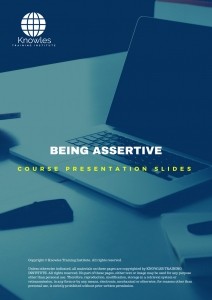
Being Assertive Course in Norway Certification
Each course participant will receive a certification of training completion
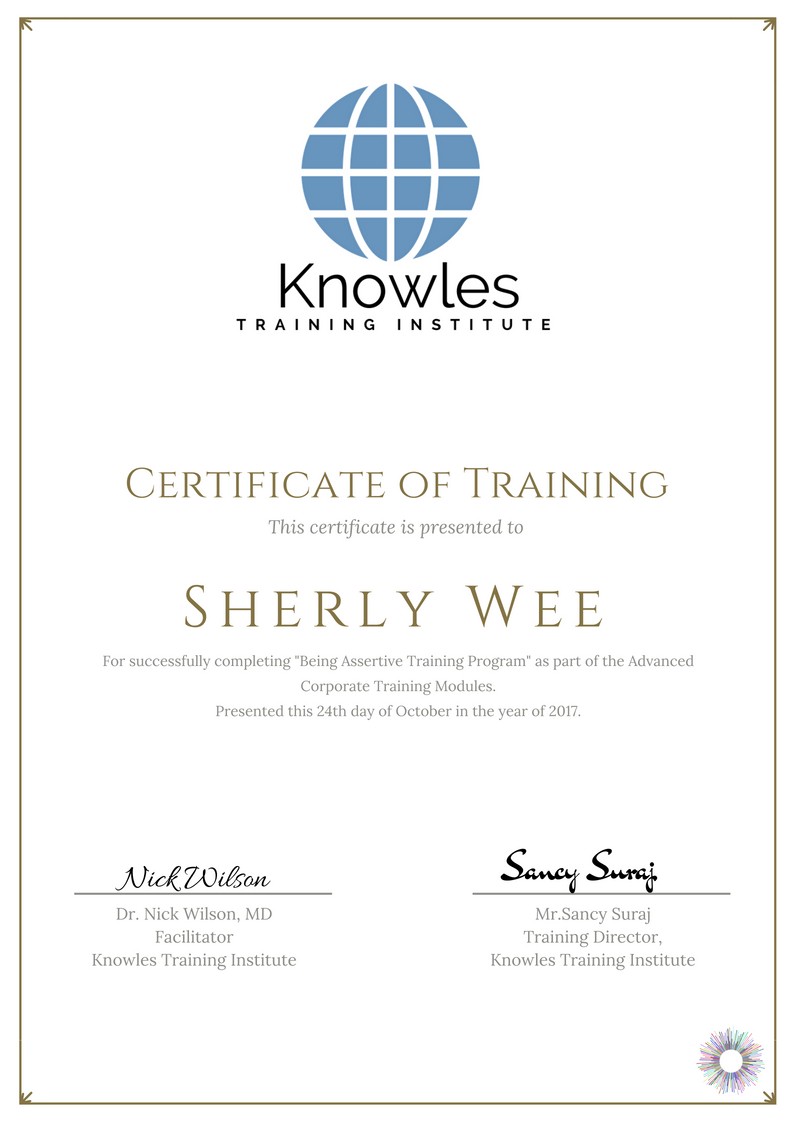
Course Fees For Assertive Training Course in Norway
There are 4 pricing options available for this Being Assertive training course in Norway. Course participants not in Norway may choose to sign up for our online Being Assertive training course in Norway.
- USD 679.97 For a 60-minute Lunch Talk Session.
- USD 289.97 For a Half Day Course Per Participant.
- USD 439.97 For a 1 Day Course Per Participant.
- USD 589.97 For a 2 Day Course Per Participant.
- Discounts available for more than 2 participants.
Upcoming Being Assertive Training Course in Norway Schedule
Contact us for the latest Being Assertive course in Norway schedules:
Email: contact@knowlesti.co.no
Message:
Download Being Assertive Course in Norway Brochure
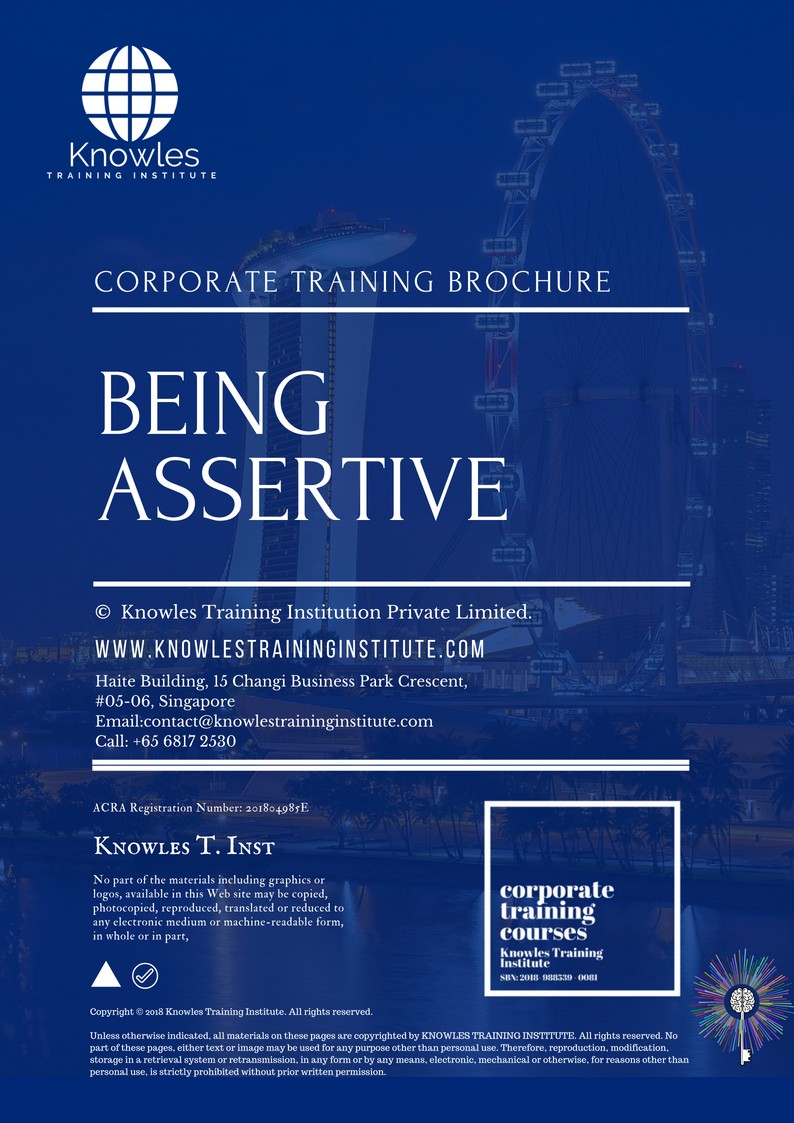
Request for this Being Assertive course in Norway brochure. Fill up the short information below and we will send it to you right away!
Post Training Support: A vast majority of training does not have any effect beyond 120 days. To work, training has to have a strong pre- and post-training component. Post-training reinforcement helps individuals to recall the understanding and ask questions.
Blended Learning: Learning does not occur in the classroom. Virtually everybody prefers distinct ways of learning. Successful learning should have a multi-channel, multi-modal strategy.
- We Understand The Industry: We’ve got a profound comprehension of the business, business design, challenges, strategy and the that our participants are in and have designed the courseware to cater to their professional needs.
- Course Content: Knowles Training Institute’s material is relevant, of high quality and provide specific learning results. Participants will leave the training course feeling as they have gained a strong understanding and will also be in a position to execute what they have learned sensibly.
Course Development — The workshop modules follow a systematic and logical arrangement. This structure helps to ensure that the course material allows the facilitators to deliver the course in a logical arrangement. Consider the subjects as building bricks into learning, our facilitators slowly build towards a comprehensive picture of this entire topic.


Course Enquiries

Fill up the form and we will get back to you in less than 1 working day.
Alternatively, give us a call to have one of our training consultants contact you. Our corporate training courses can be contextualized to meet your organization’s training needs. Leverage on our large pool of professional trainers and consultants for your organization’s training needs.
Email: contact@knowlesti.co.no
We Guarantee 100% Privacy. We Respect Your Privacy. Your Information Will Never Be Shared.

